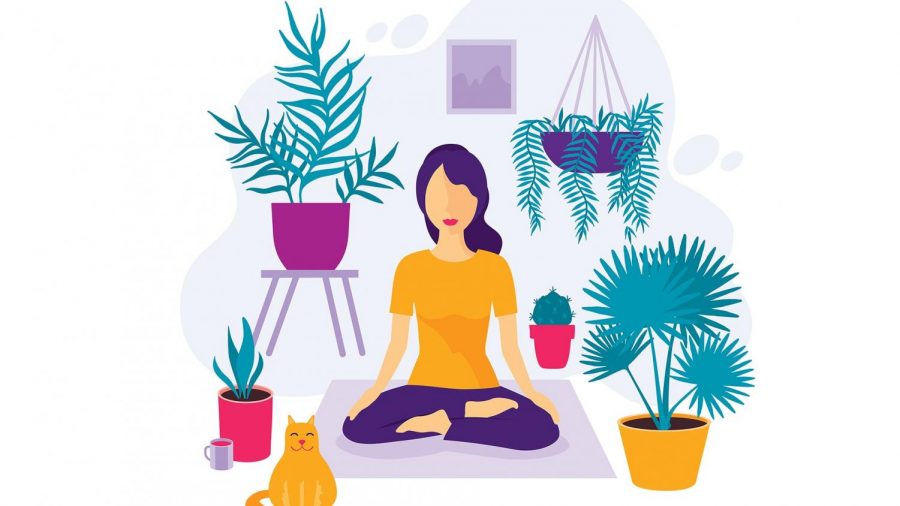Stuck in Quarantine? Try Meditation, the Art of Doing Nothing
You can find true happiness and inner peace by practicing meditation, the art of doing nothing
April 24, 2020
Now that we are all quarantined to help prevent the spread of COVID-19, you may be feeling a few things. First and obviously, confined to your living space. You’re aching for a change of scenery, to go out, to see your friends. Or maybe you’re usually a “house cat,” but now that someone is actually telling you to stay inside, it’s the last thing you want to do.
But maybe you noticed something you didn’t pay much attention to before. Your thoughts. They may seem louder and more jumbled up than usual. This is okay! There is a lot more time for us to be inside our head right now.
If you’re like most people, you’ll create a list of tasks to distract yourself and make yourself feel more productive. As humans, we often look for the next thing to “get done.”
However, you can find true happiness and inner peace by doing nothing. By nothing, I mean practicing meditation. Here are some facts about the art of doing nothing.
1. Meditation does not have to incorporate religion or spirituality.
While meditation can be tied to religious practices, philosophies, and cultures, by itself its just deep breathing exercise to calm and focus your mind. There are many forms of meditation to explore, but simply following your breath is often the best place to start.
2. Meditation is does not mean “having no thoughts.”
For many people who overthink or have trouble focusing and staying still, the idea of sitting with your thoughts may seem impossible or scary. Still, taking the time to control your thoughts and attain peace of mind is beneficial to your mental health. When you find your mind wandering off, bring your focus back to your breath. If this is difficult or uncomfortable, try a guided practice.
3. Meditation is observation, not a competition.
There’s no such thing as meditating “well” or “poorly.” Focusing may be difficult, and that’s why you “practice” meditation. Importantly, meditation should be practiced without judgement. It is something you do for yourself, and not with expectations or self judgement. Just relax. Meditation can serve as an opportunity to wind down, address any tension throughout your body, and listen to your thoughts.
4. Meditation benefits physical and mental health.
Research shows that meditation leads to an increase of gray matter in the brain. This improves vision, hearing, memory, emotions, speech, decision making, muscle control and self-control. Meditation can also improve your immune system, relieve pain, and lower blood pressure, in turn preventing heart disease.
5. It’s easy to get started.
Meditation has gained popularity over the years. Today, many people are giving it a try, eager to receive benefits. There are many apps, podcasts, and YouTube videos available to help you get started. I use the app Headspace which has a free, 10 day-basic practice that you can experiment with to get a better understanding of the basics of meditation. The app allows you to select the duration of your meditation session, and provides inspirational push notifications throughout the day.
Meditation is a great practice for those looking to incorporate more self care into their daily routines, by bettering their mental and physical health. Meditation is a productive way of doing nothing. Maybe you’ll try something new during quarantine and give meditation a chance.


